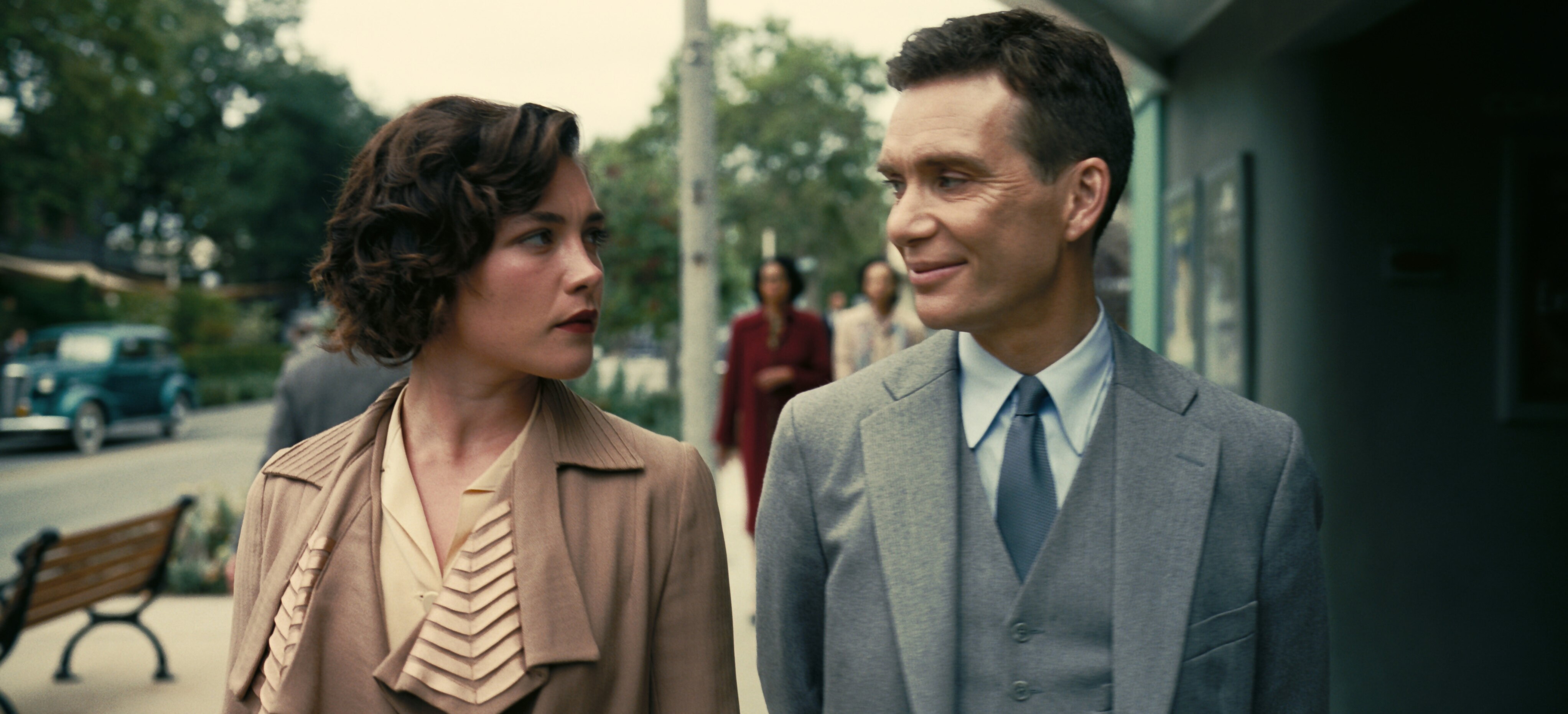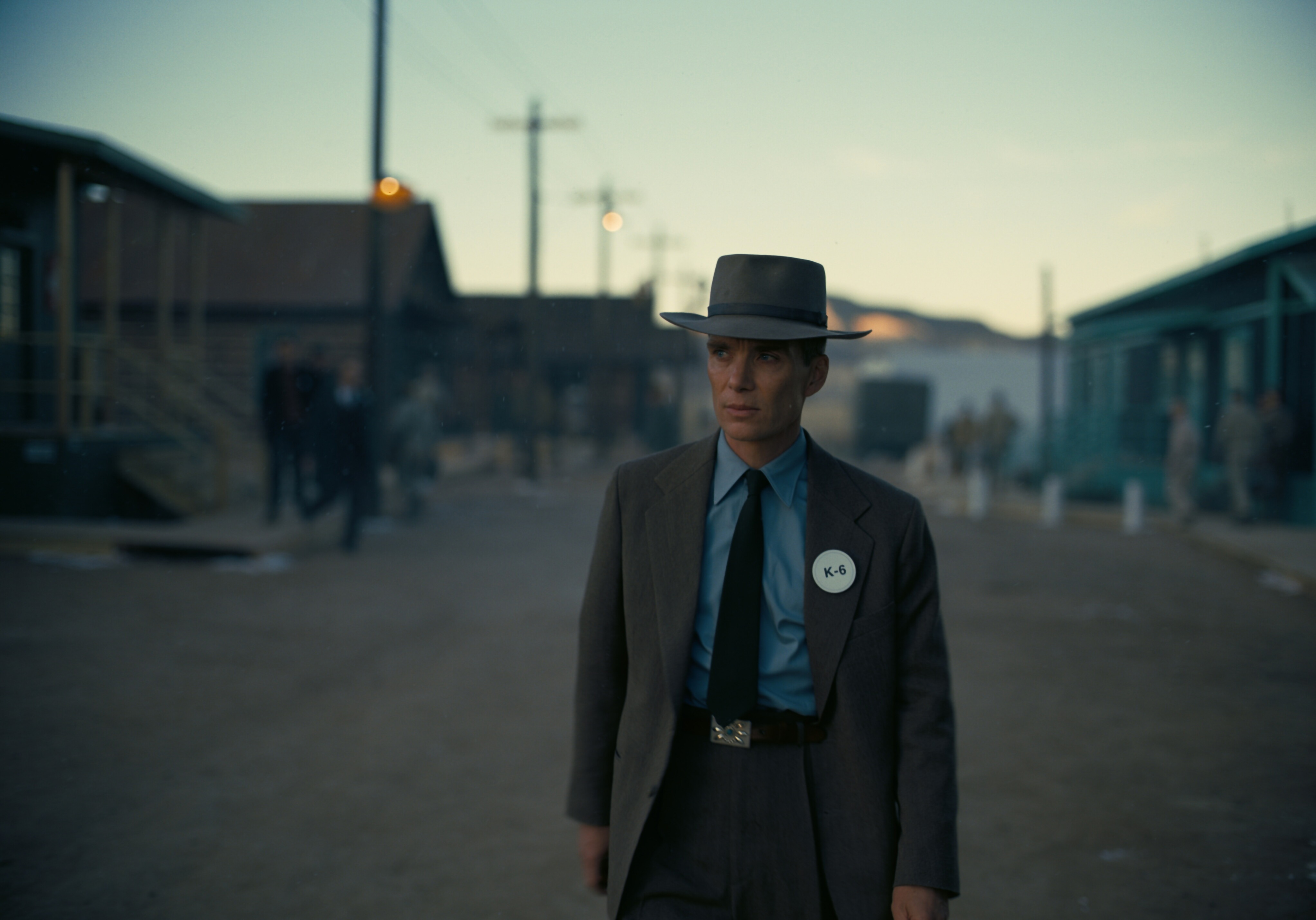★★★★☆
Oppenheimer is Christopher Nolan’s 12th feature film and perhaps his most ambitious yet. That’s saying something considering this is the director of challenging epics such as Interstellar, Dunkirk and Tenet, the latter arguably being one of Nolan’s weakest films.
Oppenheimer is definitely a step up from Tenet; a much more relatable and human story and one that bears a huge historical significance. Nolan attacks J. Robert Oppenheimer’s story head-on, attempting to understand a complex man who would go on to be credited as the ‘Father of the Atomic Bomb’.
Here, he is presented as a man with a sense of uncompromising vision and purpose, but one who would become haunted by the part he played in history.
As we’ve already seen from the impressive trailers, Oppenheimer unfolds both in colour and black-and-white sequences. Nolan has already commented on this choice, with colour scenes representing Oppenheimer’s subjective experience. The black-and-white unfold from the perspective of Robert Downey Jr.’s Lewis Strauss and are more objective in nature.
The style choice proves a tad jarring at first. In fact, the entire first hour of Oppenheimer is rushed and packed to the brim with information which is near-impossible to absorb. Nolan throws characters, names, places and science-y words at us at a dizzying pace and it becomes exhausting.
Thankfully, after that first hour, Oppenheimer really finds its groove. The dual timeline follows Oppenheimer as he attempts to build a bomb to “end all wars” as well as the fallout from that as he is, years later, sitting in front of a security council, being questioned about his past relationships and intentions.
The difference between Oppenheimer in 1942 and 1954 is staggering. Not so much because of any make-up or VFX tricks to age actor Cillian Murphy, but the haunted look on the actor’s face. Murphy is simply extraordinary as Oppenheimer, a man driven by blind ambition and aimless innovation.

Credit: Universal Pictures
Murphy is supported by the very handsome and talented cast around him. Out of the large – too large, you might say – cast, Downey Jr. and Emily Blunt, who plays Oppenheimer’s wife Kitty, stand out. Downey Jr. is remarkable in a tricky role that’s far-removed from his witty public persona and his role as Tony Stark in the MCU.
READ MORE: The true story behind Christopher Nolan’s Oppenheimer
But Oppenheimer is definitely a bit of a sausage fest. While Blunt is sharp as Kitty, Nolan’s writing is flawed when it comes to his female characters. Oppenheimer includes Nolan’s first sex scene and it’s exactly as you’d imagine it; unfussy, straight to the point and a little awkward.
Florence Pugh plays Oppenheimer’s early girlfriend Jean Tatlock. She only has roughly 15 minutes of screentime, but Pugh makes the most of it, even though a large portion of the role requires being naked. Without spoiling too much, Kitty and Jean’s characterisations feel a little old-fashioned and troubling. There simply doesn’t seem to be time or any real effort to build or develop the women in Oppenheimer’s life.
READ MORE: Barbie vs Oppenheimer | Marketing genius or cinematic suicide?
Ludwig Göransson’s score, as expected, is magnificent, but heavily planted in some scenes, which marginally eats away some of the film’s magic. Hoyte Van Hoytema’s cinematography is awe-inspiring and Nolan, a pragmatic, economic director, certainly knows how to frame a shot and find the essence of every scene.

Credit: Universal Pictures
The tight close-ups on Oppenheimer tell us more about him than any line of dialogue ever could and a sequence where the crew tests the bomb might be the finest scene we’ll see on the big screen this year. Nolan has previously stated that the film is a little bit of a horror film and that statement feels correct; there is something utterly horrifying about Oppenheimer’s story, but crucially, Nolan never defends or judges him.
Nolan also never shows us any of the destruction that Oppenheimer’s creation leaves behind. Oppenheimer casually mentions the land they have built the testing site and an entire town should be given “back to the Indians”, but for the most part, Oppenheimer is another story about a white man’s guilt without any input from the communities that were affected by his actions.
Oppenheimer, much like its titular character, slightly falls victim to its own, endless ambition. The film’s sheer density and a revolving door of characters make it heavy, but more often than not, Nolan’s filmmaking soars. Nolan, who has always been accused of being unemotional and cold as a storyteller, has crafted his most humane film yet.
Oppenheimer is in cinemas 21 July.





